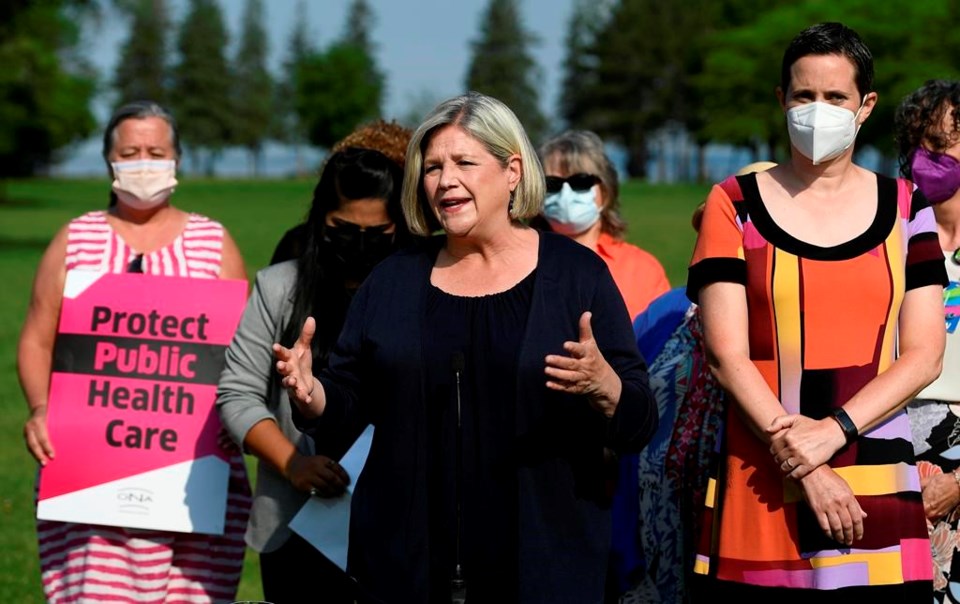TORONTO — Ontario's New Democrats would work with Ottawa on decriminalizing drugs for personal use if elected to form government, but the provincial Liberals aren't considering a similar move.
The issue emerged on the last day of the election campaign in Ontario, following the announcement of a three-year agreement between British Columbia and the federal government that means people won't be charged for possessing up to 2.5 grams of some illicit drugs.
NDP Leader Andrea Horwath said decriminalizing simple possession of drugs is part of her party's plan to address the overdose crisis, along with lifting a cap on safe drug consumption sites and improving access to treatment.
"It is about saving lives, and that's what we have to do," Horwath said at a Wednesday campaign event in Brampton, Ont.
"We have to do better, and we can do better, so yes, absolutely, making sure that we have a safe drug supply, that we decriminalize simple possession, but most importantly, that we provide the services that people need to try to help them get well."
Horwath also noted that it was a New Democrat government in British Columbia that made the first-in-Canada decriminalization policy happen.
Ontario's New Democrats have also promised to declare the opioid crisis a public health emergency. Horwath said conversations around the limit of drugs exempted under a decriminalization policy – whether she would ask for a 4.5 gram limit as B.C. did – would have to happen with experts before making a submission to the federal government.
Liberal Leader Steven Del Duca did not take questions from reporters at a morning event in Toronto. But a spokeswoman for the Liberal campaign said the party isn't considering decriminalizing drugs.
The Liberal party has said it will restart an opioid task force, expand access to the overdose reversal medication naloxone and lift the cap on new consumption and treatment sites that was brought in by the Progressive Conservative government.
Progressive Conservative Leader Doug Ford, who is seeking to hold on to the premier's office, was not scheduled to take media questions for the second day in a row, and his campaign did not immediately respond to requests for comment on the issue.
Ford's government in 2019 changed the addiction treatment model from safe injection sites to consumption and treatment services. At the time fifteen sites were approved and some existing overdose-prevention sites were forced to shut down.
The Tories capped the number of sites at 21 and this year approved the province’s 17th site.
Once British Columbia's new plan takes effect next year, it will join a small group of world jurisdictions including Portugal, Mexico, Columbia and the state of Oregon where drug users aren't criminalized for possessing some illicit drugs for personal use, as part of efforts to stop overdose deaths.
Ontario has recorded high opioid deaths and hospitalizations recently, with rates surging significantly after the pandemic hit in 2020.
The Office of Ontario's Chief Coroner shared data in May showing 2,819 people died from opioid toxicity in 2021, up from 2,460 deaths the year before. There was a 58 per cent increase in opioid deaths between 2019 and 2020.
Dr. Tara Gomes, a researcher at Unity Health in Toronto and lead of the Ontario Drug Policy Research Network, said decriminalization is only a small part of a broad strategy needed to reduce deaths and overdoses.
Many of the opioid deaths are occurring due to the volatile drug supply, she said. And with such a small mass allowed for consumption, at 2.5 grams, Gomes worries the law could make the situation worse.
"If you're decriminalizing small amounts of the drug, in terms of a measured weight of the drug, then is there going to be a propensity for the supply to become even more potent so that those who are trafficking drugs are at less risk of criminalization?" she said.
"That could actually increase the risk for people because the drugs could actually become more potent."
She said the rules should be consistent across the country and include decriminalization, regulating the drug supply and a vast enhancement of harm reduction sites.
A decriminalization proposal from Toronto Public Health is currently up for consideration, the federal minister of mental health and addictions said during the B.C. announcement on Tuesday,
There has been a significant push for decriminalization of small amounts of drugs for personal use, including from Ontario chiefs of police and Ontario's Big City Mayors. Dr. Kieran Moore, the province's top public health doctor, supported the idea in the past when he was head of the public health unit in Kingston, Ont.
This report by The Canadian Press was first published June 1, 2022.
- With files from Noushin Ziafai and Liam Casey
Holly McKenzie-Sutter, The Canadian Press



